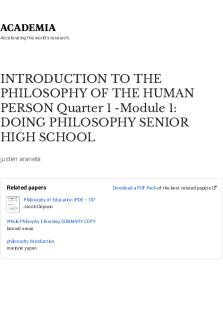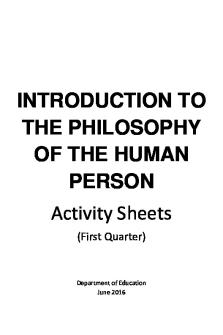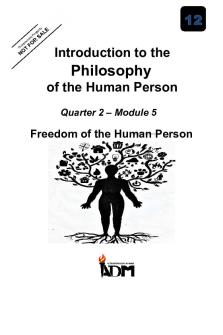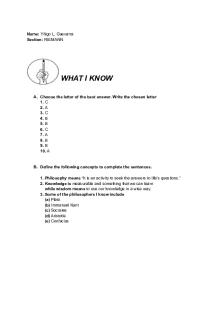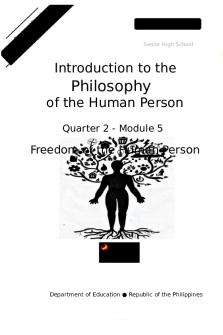INTRODUCTION TO THE PHILOSOPHY OF THE HUMAN PERSON Quarter 1 -Module 1: DOING PHILOSOPHY SENIOR HIGH SCHOOL PDF

| Title | INTRODUCTION TO THE PHILOSOPHY OF THE HUMAN PERSON Quarter 1 -Module 1: DOING PHILOSOPHY SENIOR HIGH SCHOOL |
|---|---|
| Author | Justen Araneta |
| Pages | 27 |
| File Size | 3.1 MB |
| File Type | |
| Total Downloads | 44 |
| Total Views | 880 |
Summary
SENIOR HIGH SCHOOL INTRODUCTION TO THE PHILOSOPHY OF THE HUMAN PERSON Quarter 1 – Module 1: DOING PHILOSOPHY Philosophy – Grade 11/12 Alternative Delivery Mode Quarter 1 – Module 1: Doing Philosophy First Edition, 2020 Republic Act 8293, section 176 states that: No copyright shall subsist in any wor...
Description
Accelerat ing t he world's research.
INTRODUCTION TO THE PHILOSOPHY OF THE HUMAN PERSON Quarter 1 -Module 1: DOING PHILOSOPHY SENIOR HIGH SCHOOL justen araneta
Related papers Philosophy of Educat ion (PDE – 107 Jacob Depuun Whole Philsophy E learning SUMMARY COPY benard omae philosophy int roduct ion marjorie yapan
Download a PDF Pack of t he best relat ed papers
SENIOR HIGH SCHOOL
INTRODUCTION TO THE PHILOSOPHY OF THE HUMAN PERSON Quarter 1 – Module 1: DOING PHILOSOPHY
Philosophy – Grade 11/12 Alternative Delivery Mode Quarter 1 – Module 1: Doing Philosophy First Edition, 2020 Republic Act 8293, section 176 states that: No copyright shall subsist in any work of the Government of the Philippines. However, prior approval of the government agency or office wherein the work is created shall be necessary for exploitation of such work for profit. Such agency or office may, among other things, impose as a condition the payment of royalties. Borrowed materials (i.e., songs, stories, poems, pictures, photos, brand names, trademarks, etc.) included in this module are owned by their respective copyright holders. Every effort has been exerted to locate and seek permission to use these materials from their respective copyright owners. The publisher and authors do not represent nor claim ownership over them. Published by the Department of Education Secretary: Leonor Magtolis Briones Undersecretary: Diosdado M. San Antonio Development Team of the Module Writers: Michael S. Bernal, Paciano B. Ferrer, Alejandrino C. Alac Editors: Amalia Solis, Education Program Supervisor Reviewers: Michael S. Bernal, Paciano B. Ferrer, Gener C. Irinco, Nastasia V. Besin, Ernie Ronel Tirol Mabahague ( Content ) Marianne Carol Rodia Esteban (Language) Illustrator: Layout Artist: Management Team: Malcom S. Gama, Regional Director Genia V. Santos, CLMD Chief Dennis M. Mendoza, Regional EPS In Charge of LRMS Regional ADM Coordinator Maria Magdalena M. Lim, CESO V Schools Division Superintendent Aida H. Rondilla, CID Chief Lucky S. Carpio, EPS In Charge of LRMS
Printed in the Philippines by ________________________ Department of Education – National Capital Region Office Address: Telefax: E-mail Address:
____________________________________________ ____________________________________________ ____________________________________________ ____________________________________________ 1
11/12 INTRODUCTION TO THE PHILOSOPHY OF THE HUMAN PERSON Quarter 1 – Module 1: DOING PHILOSOPHY
2
Introductory Message For the facilitator: Introduction To The Philosophy of The Human Person (Grade Welcome to the 11/12) Alternative Delivery Mode (ADM) Module on Doing Philosophy. This module was collaboratively designed, developed and reviewed by educators both from public and private institutions to assist you, the teacher or facilitator in helping the learners meet the standards set by the K to 12 Curriculum while overcoming their personal, social, and economic constraints in schooling. This learning resource hopes to engage the learners into guided and independent learning activities at their own pace and time. Furthermore, this also aims to help learners acquire the needed 21st century skills while taking into consideration their needs and circumstances. In addition to the material in the main text, you will also see this box in the body of the module:
Notes to the Teacher This contains helpful tips or strategies that will help you in guiding the learners.
As a facilitator you are expected to orient the learners on how to use this module. You also need to keep track of the learners' progress while allowing them to manage their own learning. Furthermore, you are expected to encourage and assist the learners as they do the tasks included in the module.
3
For the learner: Welcome to the Introduction to the Philosophy of the Human Person Alternative Delivery Mode (ADM) Module on Doing Philosophy. The hand is one of the most symbolized part of the human body. It is often used to depict skill, action and purpose. Through our hands we may learn, create and accomplish. Hence, the hand in this learning resource signifies that you as a learner is capable and empowered to successfully achieve the relevant competencies and skills at your own pace and time. Your academic success lies in your own hands! This module was designed to provide you with fun and meaningful opportunities for guided and independent learning at your own pace and time. You will be enabled to process the contents of the learning resource while being an active learner. This module has the following parts and corresponding icons: What I Need to Know
This will give you an idea of the skills or competencies you are expected to learn in the module.
What I Know
This part includes an activity that aims to check what you already know about the lesson to take. If you get all the answers correct (100%), you may decide to skip this module.
What’s In
This is a brief drill or review to help you link the current lesson with the previous one.
What’s New
In this portion, the new lesson will be introduced to you in various ways such as a story, a song, a poem, a problem opener, an activity or a situation.
What is It
This section provides a brief discussion of the lesson. This aims to help you discover and understand new concepts and skills.
What’s More
This comprises activities for independent practice to solidify your understanding and skills of the topic. You may check the answers to the exercises using the Answer Key at the end of the module.
What I Have Learned
This includes questions or blank sentence/paragraph to be filled in to process what you learned from the lesson.
What I Can Do
This section provides an activity which will help you transfer your new knowledge or 4
skill into real life situations or concerns. Assessment
This is a task which aims to evaluate your level of mastery in achieving the learning competency.
Additional Activities
In this portion, another activity will be given to you to enrich your knowledge or skill of the lesson learned. This also tends retention of learned concepts.
Answer Key
This contains answers to all activities in the module.
At the end of this module you will also find:
References
This is a list of all sources used in developing this module.
The following are some reminders in using this module: 1. Use the module with care. Do not put unnecessary mark/s on any part of the module. Use a separate sheet of paper in answering the exercises. 2. Don’t forget to answer What I Know before moving on to the other activities included in the module. 3. Read the instruction carefully before doing each task. 4. Observe honesty and integrity in doing the tasks and checking your answers. 5. Finish the task at hand before proceeding to the next. 6. Return this module to your teacher/facilitator once you are through with it. If you encounter any difficulty in answering the tasks in this module, do not hesitate to consult your teacher or facilitator. Always bear in mind that you are not alone. We hope that through this material, you will experience meaningful learning and gain deep understanding of the relevant competencies. You can do it!
5
What I Need to Know
This module was designed and written with you in mind. It is here to help you master the nature of Philosophy. The scope of this module permits it to be used in many different learning situations. The language used recognizes the diverse vocabulary level of students. The lessons are arranged to follow the standard sequence of the course. But the order in which you read them can be changed to correspond with the textbook you are now using. The module is divided into three parts, namely: • • •
Part 1 – The Nature and Functions of Philosophy Part 2 – Philosophical Tools and Processes Part 3 – Philosophical Reflection
After going through this module, you are expected to accomplish the following Most Essential Learning Competencies: 1. Distinguish a holistic perspective from a partial point of view. 2. Realize the value of doing philosophy in obtaining a broad perspective on life. 3. Do a philosophical reflection on a concrete situation from a holistic perspective.
6
What I Know Direction: Choose the letter that corresponds to your answer from the statements below. Write your answers on other sheet of paper. ______1.It is an activity that requires a person to examine his or her thoughts, feelings and actions and learn from experience. A. reflection C. wondering B. questioning D. reasoning ______2. What is the science and art of correct thinking? A. Ethics C. Metaphysics B. Aesthetics D. Logic ______3. The type of philosophical reflection which trains the mind to think logically. It is also the ability of the mind to construct and evaluate arguments A. Secondary reflection C. Primary reflection B. Tertiary reflection D. all of the above ______4. One of the triumvirate Greek philosophers who pioneered a method of argument called dialectic. A. Plato C. Pythagoras B Socrates D. Aristotle ______5. This is the process of thinking about something in a logical way in order to form a conclusion or judgement. A. reasoning C. intuition B. proposition D. reflection ______6. It is a term used to describe a method of philosophical argument that involves some sort of contradictory process between opposing sides. A. deductive C. Inductive B. dialectic D. reflective ______7. It is the idea that various systems (e.g. physical, biological, social) should be viewed as wholes, not merely as a collection of parts. A. holism C. existentialism B. idealism D. rationalism ______8. According to Gabriel Marcel this type of reflection enables us to look deeper into our experiences and see the bigger picture of reality. A. Secondary reflection C. Primary reflection B. Tertiary reflection D. all of the above ______9. The western philosophical tradition originated in______. A. Greece C. India B. China D. Egypt _____10. What is the branch of Philosophy that studies the nature and means of human knowledge? A. Metaphysics C. Politics B. Ethics D. Epistemology
7
Lesson
1
What is Philosophy?
More than 2500 years ago a sage in South Asia named Gautama Buddha declared that “Life is suffering.” This is the first of his Four Noble Truths. And indeed if you look at your life you will see that it is a series of challenges that you have to overcome if you want to survive. It feels like you are competing in a race in which you are required to successfully jump hurdles in order to win. And each challenge in life is really a question or a bunch of questions that you have to answer. If you are not feeling well for example you might ask, Why am I feeling this way (cause)? How can I overcome it (process)? How it will affect my life and the people around me (consequence)? Philosophy, our subject matter for this course, is really all about questions and answers. And since by now you already asked and answered hundreds of questions your life experienced already prepared you to take our philosophical journey starting now.
What’s In Picture Analysis Direction: Look at the picture below and answer the following questions.
Source: https://www.patheos.com/blogs/driventoabstraction/2018/07/blind-men-elephant-folklore-knowledge/ retrieved May 2020
8
1. What do you notice from the picture? ______________________________________________________________________________ 2. Did anyone get the correct answer? Why or why not? ______________________________________________________________________________ ______________________________________________________________________________
3. What does this picture imply about our effort to understand the realities of life or answer our perennial problems? ________________________________________________________________________ ________________________________________________________________________ ________________________________________________________________________
Notes to the Teacher The chosen texts are meant to facilitate the learner’s acquisition of insight on the topic. The role of the teacher is to stimulate the minds of the learners, guide, equip them with the needed skills, provide scafoldings and hope that eventually apply the learned skills in their daily life.
What’s New Imagine that a vaccine for Covid -19 is already available and therefore the community quarantine was lifted throughout the Philippines. Freedom at last! You decided to travel the country. However during one of your travel adventures you come upon an unfamiliar area and therefore as much as you hate to admit it you have to accept the truth: you are lost. Obviously the very first question you want to answer is the question Where am I? However to answer this question another question needs answering: How can I discover it? or
9
How do I know it? Should you ask a stranger for directions? Should you consult Google Map? Should you look for clues on road signs and street names? Answering these questions are important because knowledge is not automatic. There is a method in knowing something including knowing your present location. When you answer the first two questions successfully you will discover your location. You are no longer lost. Still you need to answer one remaining question: What should I do? Should you walk, take a bus, wait for someone to fetch you? You need to take one of these actions to arrive successfully at your
Where am I? How do I know it? What should I do?
destination. You might not realize this but you are already doing philosophy when you are answering these three questions: -Where am I? -How do I know it? -What should I do? The reason is that these three questions are the primary questions of philosophy. Let us now turn our attention to philosophy.
10
What is It
I.
The Nature and Functions of Philosophy
DEFINITION OF PHILOSOPHY Traditionally philosophy is defined as love of wisdom because it came from two Greek words philos (love) and Sophia (wisdom). You might find it strange to connect love to philosophy. You might think of philosophy as a purely intellectual discipline which has nothing to do with love. You might believe love is romance, poetry, intense passion in which you are willing to lay down your life. But you will see that philosophy can also be pursued passionately. In fact some people like Socrates died for truth. It is this centrality of love to philosophy that we call people who engages in philosophy as philosophers (lovers of wisdom). ORIGIN OF PHILOSOPHY Greece is the birthplace of philosophy in the West. To be more precise it is the ancient Greek city of Miletus in the Western coast of what is now Turkey that gave birth to philosophy. It is in this city that the first philosopher in the West, Thales, lived. Thales is the Father of Philosophy in the Western civilization. He lived between 624 and 546 BCE a contemporary of the Lydian king Croesus and the statesman Solon (Stumpf and Fieser,2008). What made Thales a philosopher is his desire to know the THALES ultimate stuff that makes up the different things we perceived. You see when we look at the world we encounter different things: people, trees, clouds, mountains, rivers, etc. Now Thales believed that despite the different things we encounter there is one underlying stuff or substance in which everything is composed. He believes that there is One in the Many. Thales was the first individual who tried to reduce the multiplicity in to a unity (Jones,1969). But his explanation of natural phenomena is devoid of gods and goddesses of the old religion of Greece. It is completely rational. It represents a departure from the mythological religion of Greece. Thales approach highlights the difference between religion and philosophy. Religion rests on faith while philosophy rests on reason.
PHILOSOPHICAL ACTIVITY Thales greatest contribution to philosophy is not his identification of water as the ultimate stuff of the universe. His greatest contribution is the problem he posed “What is the ultimate stuff of the universe?” and his approach in solving that
11
problem. Studying Thales makes us realize that philosophical activity is characterized by three things: First in terms of scope philosophy involves the widest generalizations (Rand, 1982). While people concern themselves with shoes and clothes, the latest gossip about their favorite celebrities, their crushes, philosophers concern themselves with big issues pertaining to the truth, , the good, the just, the beautiful, and the existence of practically all things. While scientists concern themselves with scientific knowledge, historians with knowledge of the past, economists with knowledge of supply and demand, philosophers concern themselves with the nature of knowledge as such (which embraces all types of knowledge previously mentioned and more). Second philosophy is all about fundamentals. A fundamental is the root cause that explains almost everything in a given context. To understand this imagine that knowledge is like a building with levels. Now the higher level depends on the lower levels (Peikoff, 1991). If somehow the lower level crumbles then all the higher levels that rest upon it will collapse. A fundamental is like the lower floor that supports everything above it. That kind of support is exactly what philosophy provides. If somehow philosophical ideas like consciousness and existence disappear then knowledge of any kind will not make any sense because there will be nothing to know (existence) and no one to know (consciousness). Third philosophy is driven by the desire to integrate things in to a one coherent whole. As the celebrated philosopher Georg Wilhelm Friedrich Hegel said “The true is the Whole (Peikoff, 1991).” If you notice Thales wants to reduce the multiplicity of things into a single stuff. He desires to find the One in the many.
BRANCHES OF PHILOSOPHY Since philosophy’s concern is vast, we have to divide it into different branches. Each branch will focus on a specific area of philosophy. To understand the branches of philosophy let us return to the three central philosophical questions we explored earlier. First the question, Where am I? By the time we reached adulthood we believe we know the answer to this question. In fact we believed that the answer is obvious that we don’t bother to look closely at the question itself. Where am I? Well let’s say I’m in Manila. You don’t need philosophy to answer that one. But if you ask a series of where questions (Where is Manila? Where is the Philippines? etc.) which at first seems childish you eventually end up with the universe. And here we have to stop asking the where question (Where is the universe is an absurd question. The universe does not exist in a place). What kind of place is the universe? Is it governed by laws? If so what laws? The study of the universe as a whole is the province of metaphysics. Metaphysics is further subdivided into ontology which studies existence as such and philosophical anthropology which deals with the fundamental and essential characteristics of human nature (Gotthelf and Salmieri, 2015).
12
The second question, How do I know it? concerns the nature of human knowledge and the way to obtain it. How do we obtain knowledge? Do we obtain knowledge by revelation, intuition, instinct or reason? Can we achieve certainty or are we doomed to suffer perpetual doubt? Is knowledge based on the things we perceive or from something else? This is the concern of epistemology which can be de...
Similar Free PDFs
Popular Institutions
- Tinajero National High School - Annex
- Politeknik Caltex Riau
- Yokohama City University
- SGT University
- University of Al-Qadisiyah
- Divine Word College of Vigan
- Techniek College Rotterdam
- Universidade de Santiago
- Universiti Teknologi MARA Cawangan Johor Kampus Pasir Gudang
- Poltekkes Kemenkes Yogyakarta
- Baguio City National High School
- Colegio san marcos
- preparatoria uno
- Centro de Bachillerato Tecnológico Industrial y de Servicios No. 107
- Dalian Maritime University
- Quang Trung Secondary School
- Colegio Tecnológico en Informática
- Corporación Regional de Educación Superior
- Grupo CEDVA
- Dar Al Uloom University
- Centro de Estudios Preuniversitarios de la Universidad Nacional de Ingeniería
- 上智大学
- Aakash International School, Nuna Majara
- San Felipe Neri Catholic School
- Kang Chiao International School - New Taipei City
- Misamis Occidental National High School
- Institución Educativa Escuela Normal Juan Ladrilleros
- Kolehiyo ng Pantukan
- Batanes State College
- Instituto Continental
- Sekolah Menengah Kejuruan Kesehatan Kaltara (Tarakan)
- Colegio de La Inmaculada Concepcion - Cebu
